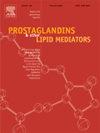Effects of walnut consumption on biomarkers of oxidative stress: A systematic review and meta-analysis of randomized controlled trials
IF 2.5
3区 生物学
Q3 BIOCHEMISTRY & MOLECULAR BIOLOGY
Prostaglandins & other lipid mediators
Pub Date : 2025-04-03
DOI:10.1016/j.prostaglandins.2025.106986
引用次数: 0
Abstract
Oxidative stress is caused by an imbalance between accumulation and production of oxygen reactive species (ROS) in tissues and cells and play a key role in many diseases. This systematic review and meta-analysis of randomized controlled trials (RCTs) was performed to analyze the effects of walnut consumption on biomarkers of oxidative stress. Databases including PubMed, Scopus, Embase and Web of science were searched until November 30th, 2024. Data were subjected to meta-analysis using a random effects model to examine the effect sizes of the pooled results. Four studies were identified eligible to be included in current meta-analysis. Walnut consumption resulted in a significant increase in catalase activity (CAT) (WMD: 42.20; 95 % CI: 34.28, 50.11). Walnut consumption did not affect other biomarkers of oxidative stress such as lipid peroxidation (LPO), reduced glutathione (GSH), oxidized glutathione (GSSG) and oxygen radical absorbance capacity (ORAC). Overall, this meta-analysis demonstrated walnut consumption increase CAT, but did not affect other biomarkers of oxidative stress. This suggests that walnut may have played an indirect and mild role in health. However, due to the limited number of studies, further investigations is suggested in this regard.
核桃消费对氧化应激生物标志物的影响:随机对照试验的系统回顾和荟萃分析
氧化应激是由组织和细胞中氧反应物质(ROS)的积累和产生不平衡引起的,在许多疾病中起着关键作用。本研究对随机对照试验(rct)进行了系统回顾和荟萃分析,以分析核桃消费对氧化应激生物标志物的影响。截止到2024年11月30日,检索了PubMed、Scopus、Embase和Web of science等数据库。使用随机效应模型对数据进行荟萃分析,以检验合并结果的效应大小。四项研究被确定为符合纳入当前荟萃分析的条件。食用核桃导致过氧化氢酶活性(CAT)显著升高(WMD: 42.20;95 % ci: 34.28, 50.11)。食用核桃不会影响氧化应激的其他生物标志物,如脂质过氧化(LPO)、还原性谷胱甘肽(GSH)、氧化性谷胱甘肽(GSSG)和氧自由基吸收能力(ORAC)。总的来说,这项荟萃分析表明核桃消费增加了CAT,但不影响氧化应激的其他生物标志物。这表明核桃可能对健康起到了间接和温和的作用。然而,由于研究数量有限,建议在这方面进行进一步的调查。
本文章由计算机程序翻译,如有差异,请以英文原文为准。
求助全文
约1分钟内获得全文
求助全文
来源期刊

Prostaglandins & other lipid mediators
生物-生化与分子生物学
CiteScore
5.80
自引率
3.40%
发文量
49
审稿时长
2 months
期刊介绍:
Prostaglandins & Other Lipid Mediators is the original and foremost journal dealing with prostaglandins and related lipid mediator substances. It includes basic and clinical studies related to the pharmacology, physiology, pathology and biochemistry of lipid mediators.
Prostaglandins & Other Lipid Mediators invites reports of original research, mini-reviews, reviews, and methods articles in the basic and clinical aspects of all areas of lipid mediator research: cell biology, developmental biology, genetics, molecular biology, chemistry, biochemistry, physiology, pharmacology, endocrinology, biology, the medical sciences, and epidemiology.
Prostaglandins & Other Lipid Mediators also accepts proposals for special issue topics. The Editors will make every effort to advise authors of the decision on the submitted manuscript within 3-4 weeks of receipt.
 求助内容:
求助内容: 应助结果提醒方式:
应助结果提醒方式:


